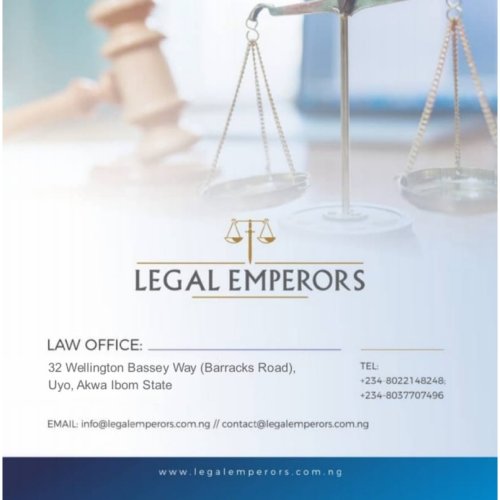Best Private Client Lawyers in Uyo
Share your needs with us, get contacted by law firms.
Free. Takes 2 min.
List of the best lawyers in Uyo, Nigeria
Nigeria Private Client Legal Questions answered by Lawyers
Browse our 1 legal question about Private Client in Nigeria and read the lawyer answers, or ask your own questions for free.
- I want to apply for a certified true copy of a Will
- How to obtain a certified true copy of a Will
-
Lawyer answer by Remedium Reel Attorneys
Of course you have to confirm first if probate has been granted because you may not be able to apply for a Certified True Copy if probate has not been granted respecting the Will. You also need to have the...
Read full answer
About Private Client Law in Uyo, Nigeria
Private client law in Uyo, Nigeria, addresses legal matters that impact individuals and families, particularly as they relate to personal wealth, property, succession, estate planning, wills, trusts, and family arrangements. Uyo is the capital city of Akwa Ibom State in southern Nigeria, and its legal environment is governed by a blend of federal laws and regional regulations. Private client legal services in Uyo are designed to protect clients’ assets, help them fulfill their wishes concerning succession, and ensure compliance with local statutory requirements. Practitioners in this field provide guidance and representation in areas such as estate administration, inheritance disputes, trusts, guardianship, and powers of attorney.
Why You May Need a Lawyer
There are several scenarios where individuals or families in Uyo may require the services of a private client lawyer. Some common situations include:
- Drafting a will or updating an existing one to reflect changes in personal circumstances or Nigerian law
- Establishing trusts to safeguard assets and/or plan for future generations
- Administering the estate of a deceased loved one and securing probate
- Resolving disputes among heirs, beneficiaries, or family members regarding inheritance
- Seeking guardianship over minors or vulnerable adults
- Arranging powers of attorney for financial, medical, or other personal matters
- Planning for cross-border assets involving family members abroad
- Managing tax implications associated with inheritance, gifts, or asset transfers
- Challenging or defending the validity of a will in court
- Facilitating property transfers within private family arrangements
Legal assistance is critical in these instances to prevent costly mistakes, avoid unnecessary disputes, and ensure compliance with relevant laws.
Local Laws Overview
The legal framework for private client matters in Uyo is shaped by a combination of federal statutes such as the Wills Act, the Administration of Estates Law of Akwa Ibom State, and customary law, which plays a substantial role especially in family and inheritance matters. Here are some key aspects:
- Wills and Testaments-Individuals have the right to make wills distributing their property, but customary law may affect the distribution of family land or communal property.
- Probate Process-The court-supervised process known as probate is required to validate a will and appoint an executor or administrator for the estate.
- Intestacy-When a person passes away without a will, the estate is distributed according to statutory or customary rules, which may not align with the deceased’s personal wishes.
- Trusts-Trusts can be established to manage assets for minors or prevent mismanagement of family wealth.
- Guardianship-Applications to the court may be required when appointing guardians for minors or incapable adults.
- Inheritance Tax-While Nigeria has limited inheritance tax provisions, there can be stamp duty and other fees associated with asset transfers.
- Property Transfers-Land ownership and transfer in Akwa Ibom State are subject to the Land Use Act and local regulations, with certain restrictions and procedural requirements for private clients.
Understanding these legal nuances, and how they intersect with cultural and family norms, is essential when navigating private client issues in Uyo.
Frequently Asked Questions
What is a will and why is it important?
A will is a legal document that outlines how a person’s assets should be distributed after death. It ensures that your wishes are respected and reduces the likelihood of inheritance disputes among your survivors.
How do I start the probate process in Uyo?
To start the probate process, the named executor of the will or a family member can apply at the High Court of Akwa Ibom State. The process involves submitting the death certificate, the original will, and other documents. The court then grants probate if the will is valid.
Can customary law affect my estate even if I have a will?
Yes, customary law can affect certain types of property, particularly family land or communal assets. It is important to consult a lawyer knowledgeable in both statutory and customary law in Uyo to ensure your wishes are enforceable.
What happens if someone dies without a will in Uyo?
If a person dies intestate, their assets are distributed according to the Administration of Estates Law or applicable customary law. This may not reflect the deceased’s personal intentions and can sometimes cause family disagreements.
How can I challenge a will that I believe is invalid?
To challenge a will, you must file a petition at the High Court showing reasonable grounds, such as lack of capacity, undue influence, or fraud. A lawyer can help guide you through the process and represent your interests in court.
What is a trust and when should I set one up?
A trust is a legal arrangement where one party (the trustee) holds assets for the benefit of others (the beneficiaries). Trusts are useful for managing assets on behalf of minors, individuals with special needs, or for tax planning.
Do I need a lawyer to draft a will in Uyo?
While it is possible to draft a will yourself, it is strongly recommended to consult a lawyer. This ensures your will meets legal standards and reduces the risk of it being contested or declared invalid.
Are there inheritance taxes in Akwa Ibom State?
Nigeria currently has limited inheritance tax laws. However, other costs like stamp duty and statutory fees may apply when transferring assets, especially real property.
How should I choose a guardian for my children?
You can appoint a guardian in your will or through a separate legal declaration. It is wise to discuss the decision with the intended guardian and formalize it legally to avoid future disputes.
Can non-residents inherit property in Uyo?
Yes, non-residents can inherit property in Uyo. However, the process may involve additional documentation and compliance with immigration and property transfer laws. Legal advice is advisable in cross-border inheritance cases.
Additional Resources
If you require more information or assistance with private client matters in Uyo, the following resources can be helpful:
- The Akwa Ibom State Judiciary - The High Court is responsible for probate, administration of estates, and family-related legal matters.
- Nigerian Bar Association, Uyo Branch - Offers directories of qualified lawyers who specialize in private client law.
- Akwa Ibom State Ministry of Justice - Provides legal information, support, and resources for residents.
- Local Legal Aid Services - For those who cannot afford private legal representation, organisations in Akwa Ibom offer pro bono services.
- Traditional Rulers’ Councils - In cases involving customary law, local chiefs or family heads may offer guidance, though a lawyer’s advice remains essential.
Next Steps
If you need legal assistance with a private client matter in Uyo, consider the following steps:
- Identify the specific private client need, such as will drafting, trust establishment, or estate administration.
- Gather relevant documents, such as deeds, birth certificates, previous wills, and any correspondence related to the matter.
- Contact a qualified private client lawyer in Uyo, preferably one with experience in both statutory and customary law.
- Arrange a consultation to discuss your goals and circumstances. Be open and honest about your wishes and any family complexities.
- Follow your lawyer’s advice on the next legal steps, such as preparing documents, court applications, or mediation with family members.
Taking prompt action and seeking professional help will greatly improve the chances of a smooth and effective resolution of your private client matters in Uyo.
Lawzana helps you find the best lawyers and law firms in Uyo through a curated and pre-screened list of qualified legal professionals. Our platform offers rankings and detailed profiles of attorneys and law firms, allowing you to compare based on practice areas, including Private Client, experience, and client feedback.
Each profile includes a description of the firm's areas of practice, client reviews, team members and partners, year of establishment, spoken languages, office locations, contact information, social media presence, and any published articles or resources. Most firms on our platform speak English and are experienced in both local and international legal matters.
Get a quote from top-rated law firms in Uyo, Nigeria — quickly, securely, and without unnecessary hassle.
Disclaimer:
The information provided on this page is for general informational purposes only and does not constitute legal advice. While we strive to ensure the accuracy and relevance of the content, legal information may change over time, and interpretations of the law can vary. You should always consult with a qualified legal professional for advice specific to your situation.
We disclaim all liability for actions taken or not taken based on the content of this page. If you believe any information is incorrect or outdated, please contact us, and we will review and update it where appropriate.
Browse private client law firms by service in Uyo, Nigeria
Uyo, Nigeria Attorneys in related practice areas.









